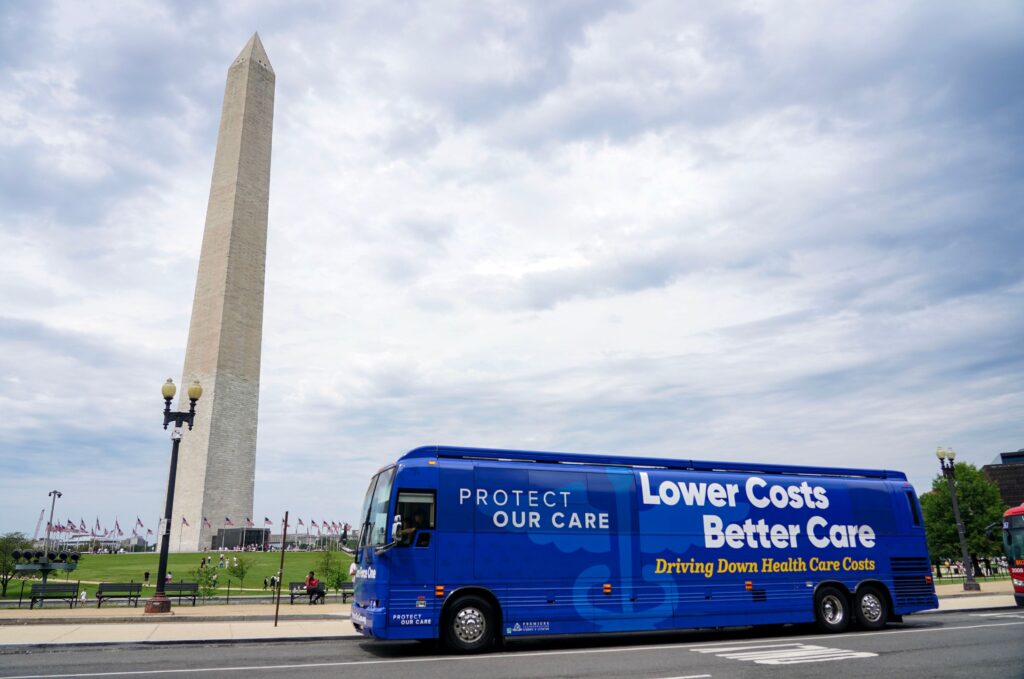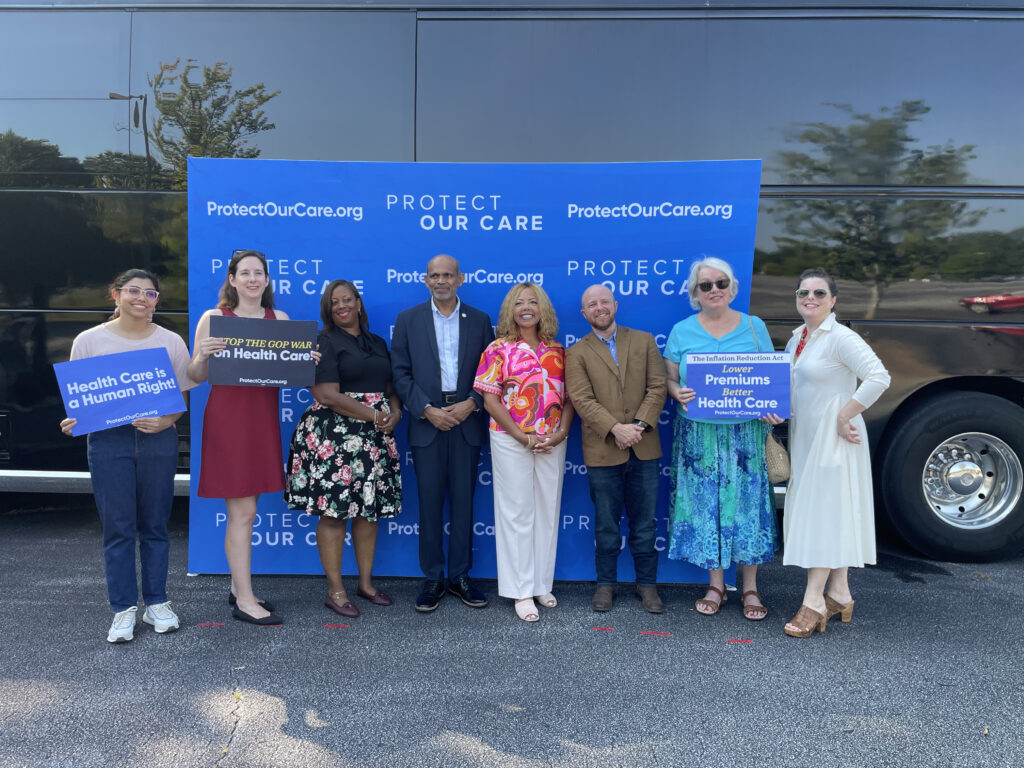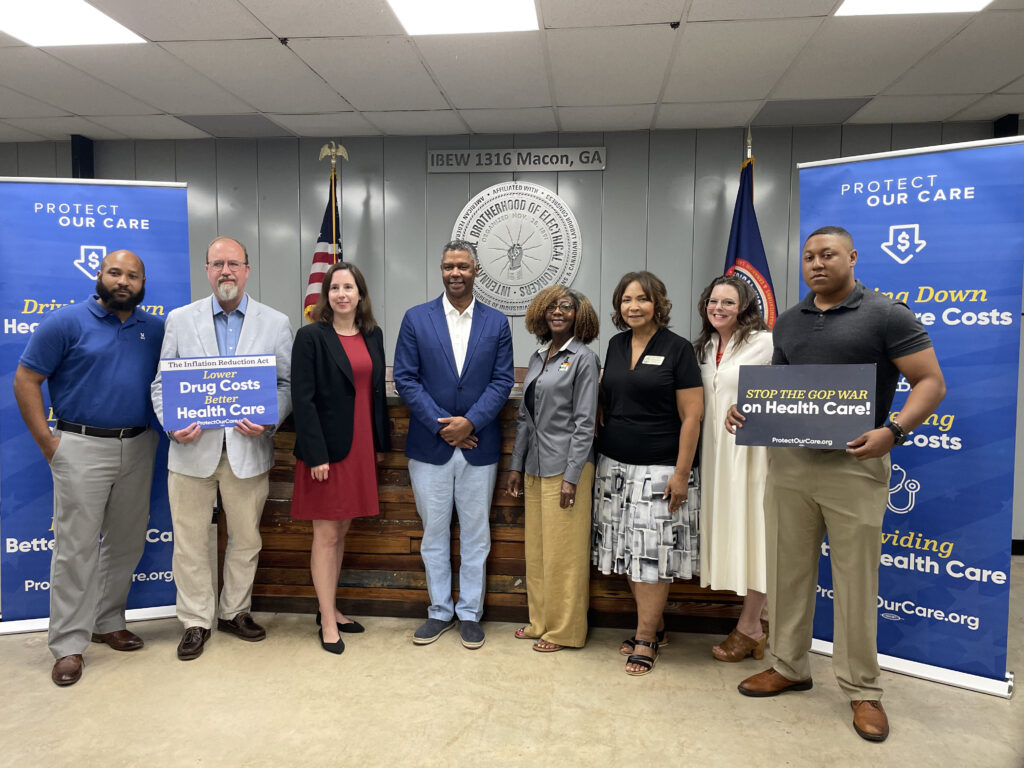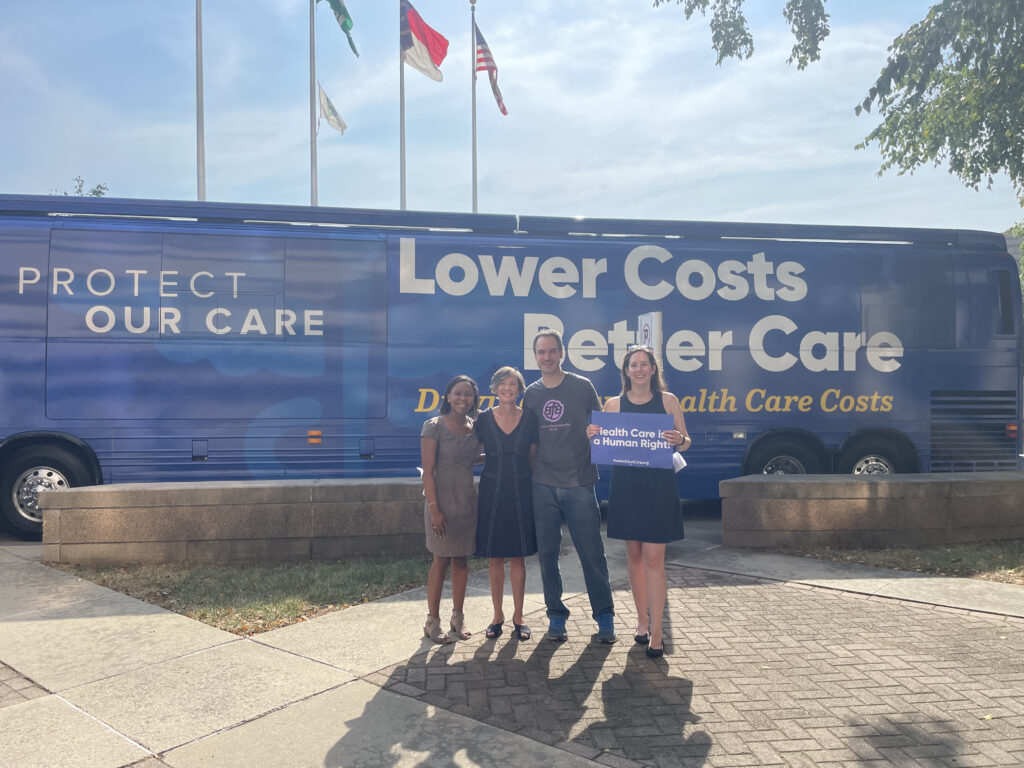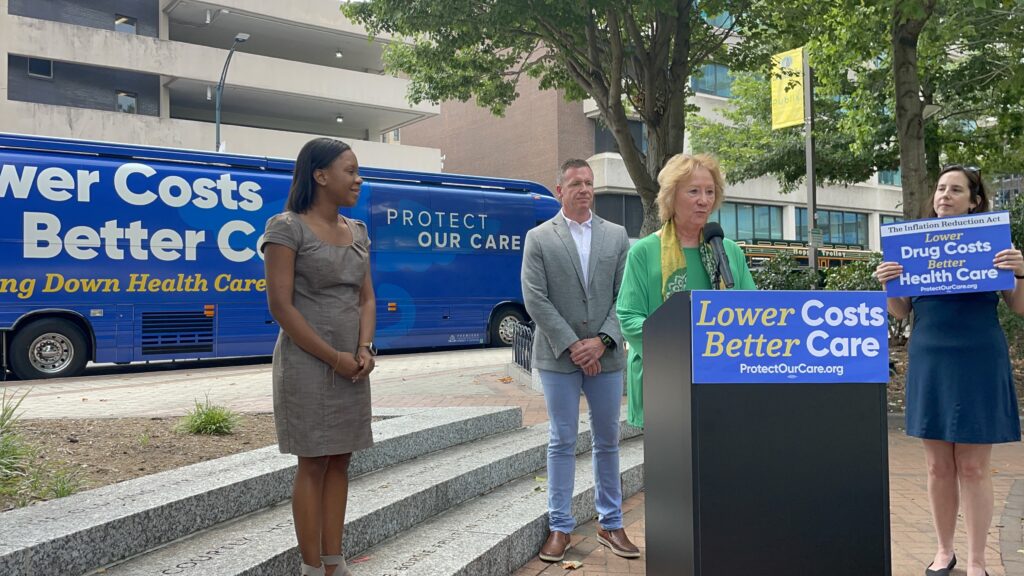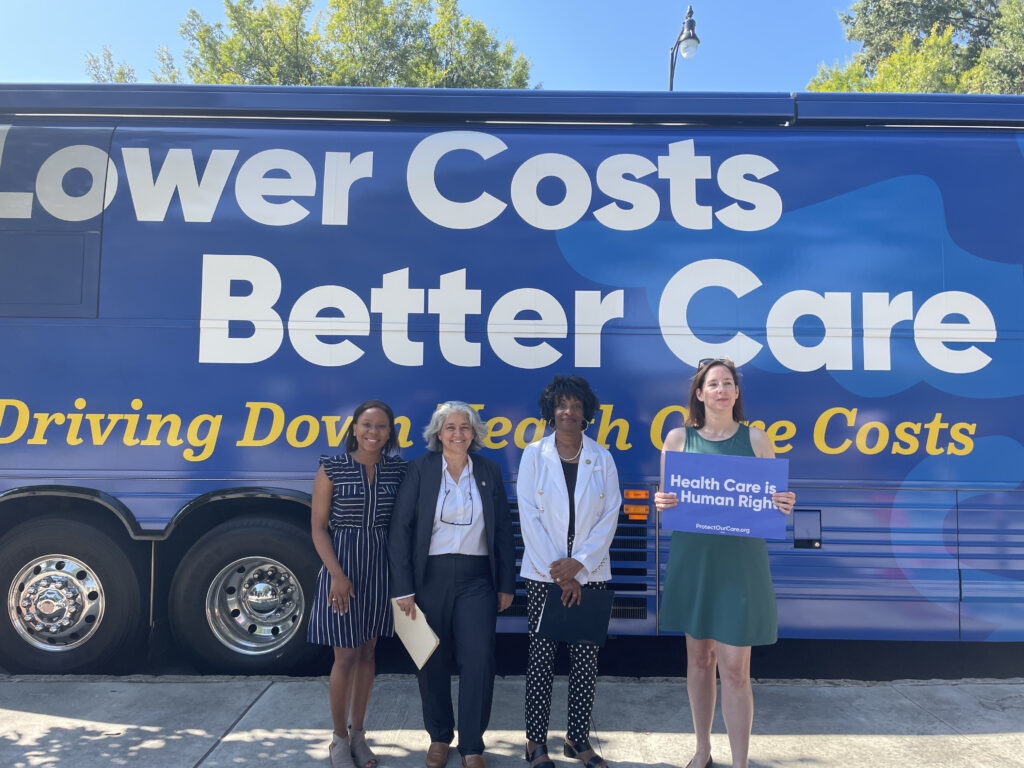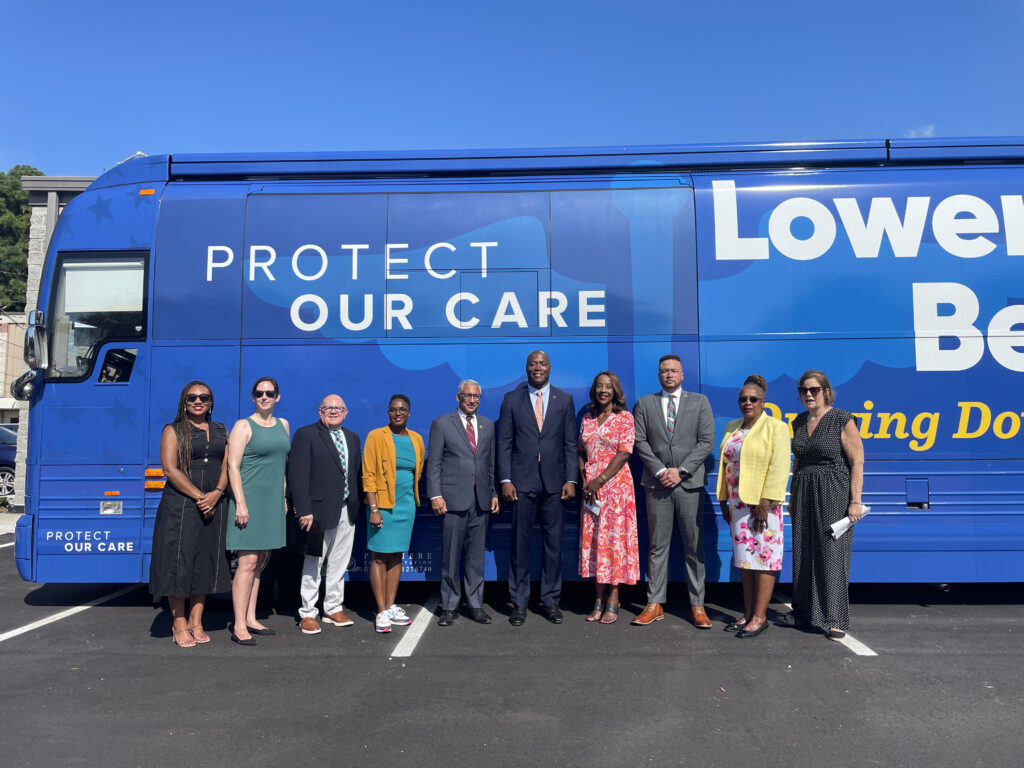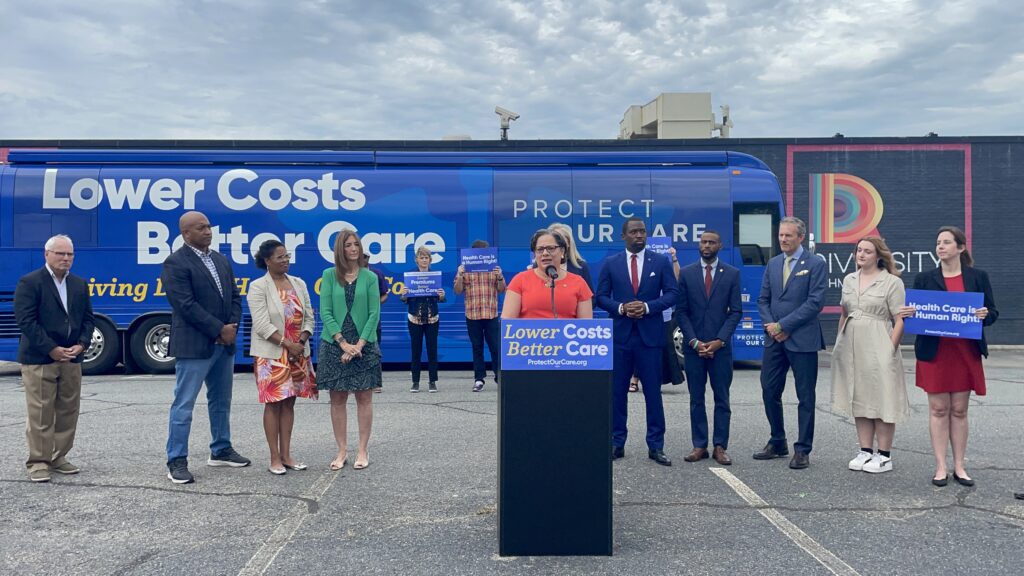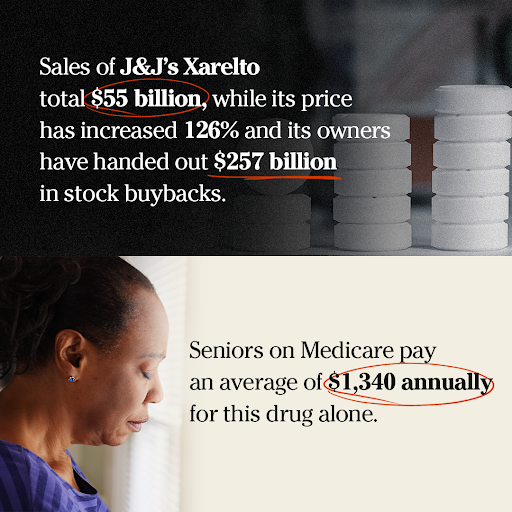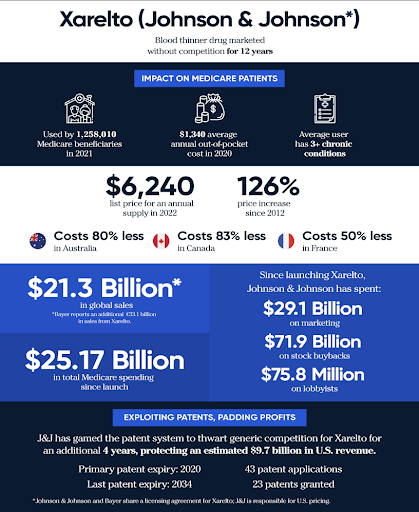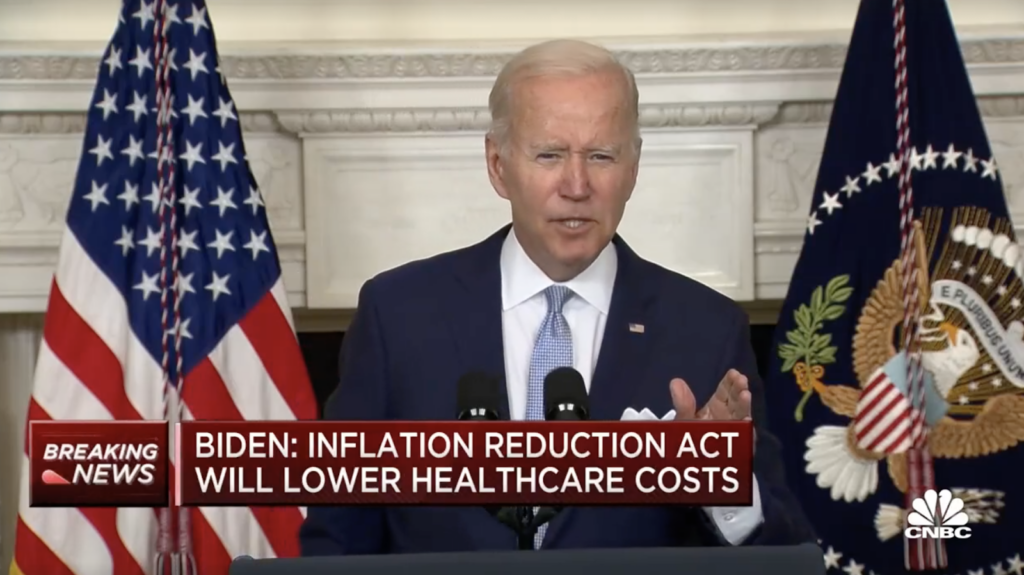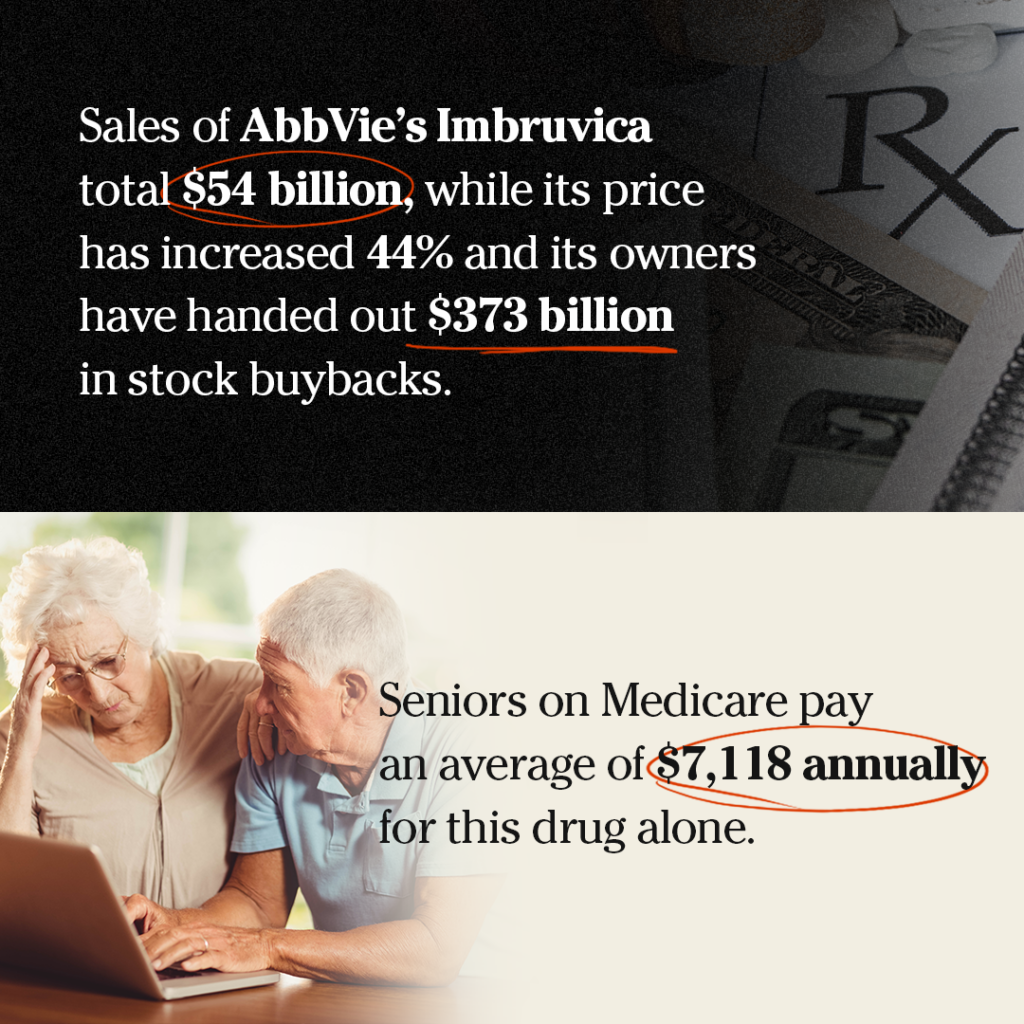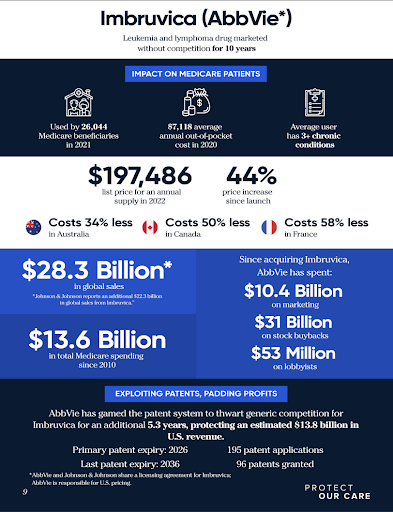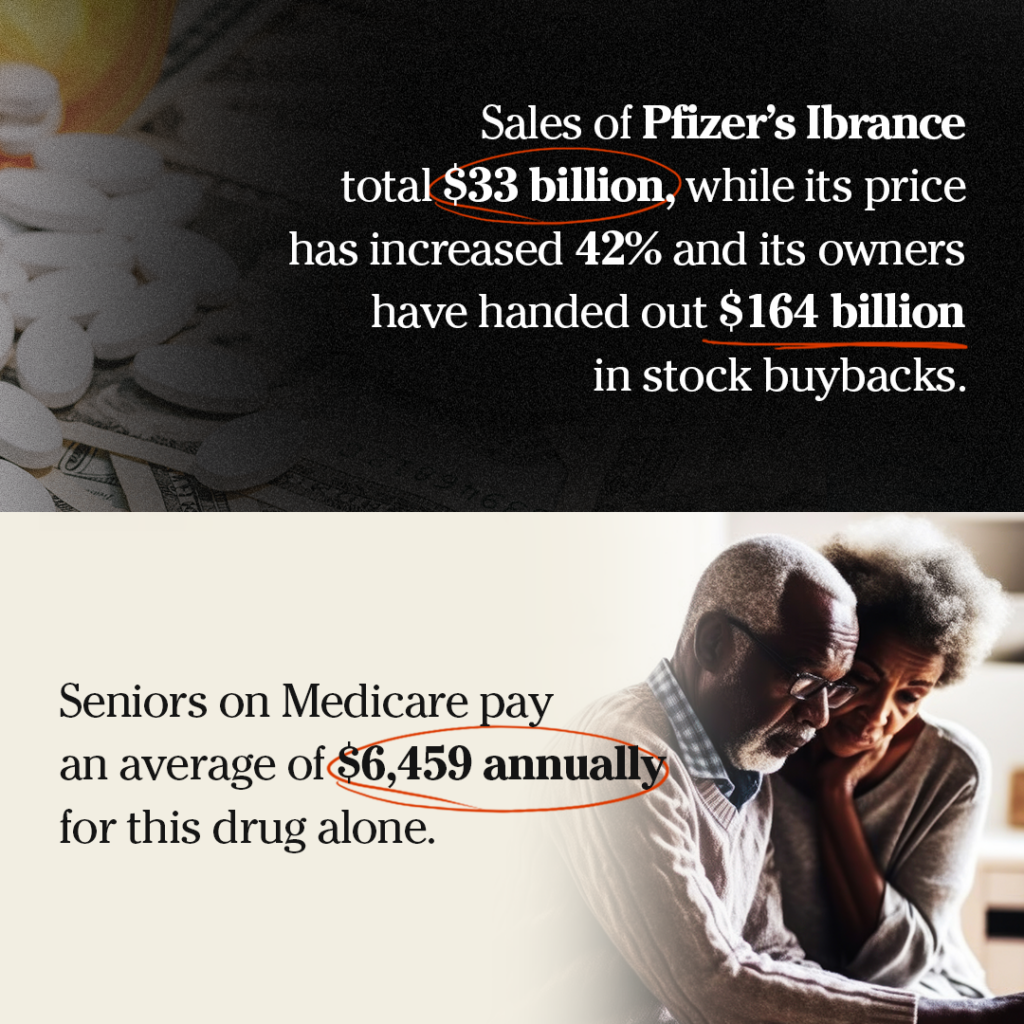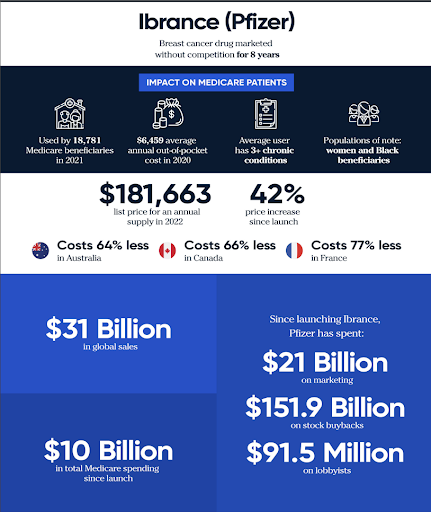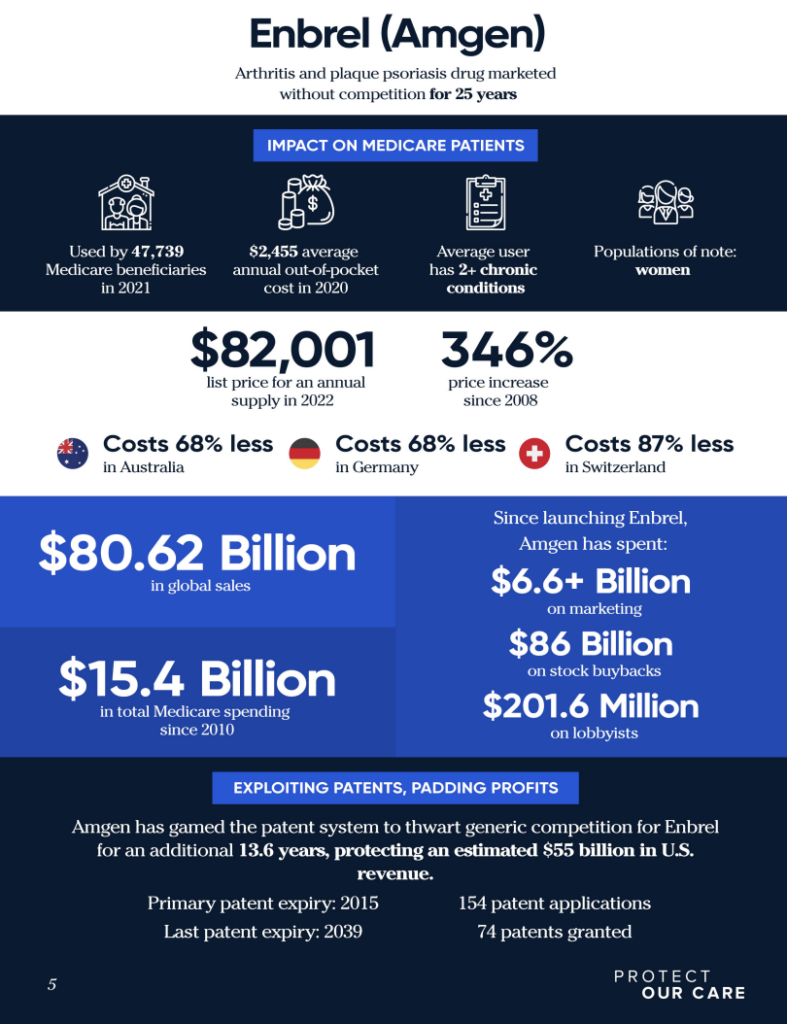Biden Administration Set to Announce First Round of Drugs to Be Eligible for Medicare Negotiation by September 1
Right now, millions of people are benefiting from the Inflation Reduction Act’s provisions to drive down health care and prescription drug costs, but big drug companies and their allies are in the courts trying to dismantle the Inflation Reduction Act’s core provision of giving Medicare the power to negotiate lower drug prices.
The Biden administration is working tirelessly to implement the Medicare Drug Negotiation Program. By September 1, CMS will announce the first round of drugs that are selected for price negotiations. These will likely be drugs used by millions of seniors to treat conditions like blood clots, type 2 diabetes, arthritis, and cancer.
Merck, Bristol Myers Squibb, Johnson & Johnson-owned Janssen Pharmaceuticals, Boehringer Ingelheim, AstraZeneca, Novartis, and Novo Nordisk as well as mega lobbying groups PhRMA (of which Amgen, Johnson & Johnson and others are members) and the US Chamber of Commerce (which represents AbbVie as a member), have filed meritless lawsuits against the federal government in an effort to stop Medicare from negotiating for lower prescription drug prices — the most popular provision of the Inflation Reduction Act.
Since the enactment of the Negotiation Program, drug companies have announced massive, above-expectation profits while arguing that negotiation is “tantamount to extortion” and will “upend…pharmaceutical innovation.” They’re just trying to protect their massive profits. While they rake in billions, U.S. drug prices are up to four times higher than prices in other high-income countries, leading patients in America to cut pills and skip doses to make ends meet.
Medicare drug price negotiation is projected to lower costs for seniors and save taxpayers tens of billions of dollars, but big drug companies are eager to protect their outsized prices and profits. Drug companies that manufacture drugs likely to be eligible for negotiation now or in the near future typically exploit the patent system to keep competitor drugs off the market, spend tens of millions on lobbying, and increase their list prices at rates that far exceed inflation.
What’s At Stake?
These lawsuits seek to end Medicare’s new ability to negotiate lower prescription drug prices for Medicare beneficiaries. If the big drug companies get their way, patients will pay more so the drug companies can make more money:
- GONE: Medicare’s power to negotiate lower prices for the most popular and expensive prescription drugs. Under the Inflation Reduction Act, Medicare is set to begin negotiating prices for 10 of the top 50 most expensive Part D drugs in 2026, adding another 15 drugs in 2027 and 2028, and another 20 in 2029 and subsequent years.
- GONE: $98.6 billion in Medicare savings over the next decade from the drug negotiation program, which translates into savings for patients and taxpayers.
- GONE: Lower Part D premiums and lower out-of-pocket drug costs for certain Medicare beneficiaries who rely on qualifying drugs.
Who Is Behind These Lawsuits?
The plaintiffs are strategically filing these junk lawsuits in a variety of different federal court jurisdictions. Merck & Co. filed in the District Court for the District of Columbia, Bristol Myers Squibb and Janssen Pharmaceuticals, Inc., owned by Johnson & Johnson, filed in the District of New Jersey Trenton Vicinage, PhRMA et al. filed in the Western District of Texas, and the US Chamber of Commerce et al. filed in the Southern District of Ohio Western Division. Boehringer Ingelheim filed in the District of Connecticut, AstraZeneca filed in the District of Delaware, and Novartis & Novo Nordisk filed separately in the District of New Jersey.
The Plaintiffs
Merck. Merck sells Januvia, a Type 2 diabetes drug that has been selected for negotiation. Januvia has been on the market without competition for 17 years and has grossed Merck $49.9 billion in sales since its launch. Medicare has spent nearly $28 billion on the drug since 2010, spending an average of $4,343 per beneficiary as of 2021. Patients in countries like Australia paid around 87 percent less – all while Merck CEO Robert Davis raked in $13.72 million.
Bristol Myers Squibb. Bristol Myers Squibb (BMS) is motivated to block the negotiation program because its blockbuster drug Eliquis, a highly profitable blood thinner that can be as much as 78 percent cheaper overseas, has been selected for negotiation. In 2021 alone, Medicare spent over $12.5 billion on the blood clot drug, which is taken by over three million Medicare beneficiaries. BMS also believes their cancer drug Opdivo is likely to qualify for negotiation; Medicare spent approximately $1.6 billion on Opdivo in 2021.
The Pharmaceutical Research And Manufacturers Of America (PhRMA). PhRMA represents many of the largest pharmaceutical companies in the country, including drug giants Pfizer, Amgen, Eli Lilly & Company, and Johnson & Johnson, as well as Merck and Bristol Myers Squibb, and has lobbied fiercely against lowering drug prices for decades. The pharmaceutical industry outspent every other industry on lobbying in 2022, with PhRMA spending over $29 million on lobbying and tens of millions more on false and misleading ads trying to defeat the Inflation Reduction Act’s provisions to lower drug costs in Congress.
Other plaintiffs receive direct financial support from PhRMA and have deep PhRMA connections. The National Infusion Center Association and the Global Colon Cancer Association are also joining PhRMA’s lawsuit — both of which have aligned with PhRMA in previous lawsuits to protect big drug companies’ ability to charge sky-high drug prices. The National Infusion Center Association received $120,000 from PhRMA in 2019, while the Global Colon Cancer Association got at least $50,000 and has spent years lobbying against a myriad of efforts to lower prescription drug prices ranging from importation to cancer drug pricing regulations. The Global Colon Cancer Association is led by a number of “corporate members” from pharmaceutical and biotech companies represented by PhRMA.
The U.S. Chamber of Commerce, and the Michigan, Ohio, and Dayton Area Chambers. As STAT concluded, “There aren’t many groups more well-funded than the pharmaceutical industry on Capitol Hill — there are two, to be precise — and the Chamber is one of them. The Chamber has spent $29.6 million lobbying so far this year, nearly double the $15.2 million spent by the brand drug industry lobby PhRMA, according to a list compiled by OpenSecrets.”
In late September, a federal district court judge dealt a major blow to the plaintiffs, rejecting the Chamber of Commerce’s motion for a preliminary injunction that sought to block the implementation of the Medicare drug negotiation program and suggesting he would reevaluate whether the Chamber in fact had standing to bring the case following limited discovery, an amended complaint, and the government’s renewed motion to dismiss. The judge ruled, “Because the Court, at this early juncture in the litigation, cannot tell with certainty whether or not Plaintiffs have standing to raise each of their claims, they necessarily cannot have a strong likelihood of success on the merits of their due process claim.”
Janssen Pharmaceuticals, Inc., owned by Johnson & Johnson. Johnson & Johnson’s Janssen sells Imbruvica, a leukemia drug that was selected for negotiation and has grossed the company $22.33 billion since 2013. The drug, which costs around 58 percent less in other high-income countries like France, cost Medicare $3.15 billion in 2021 alone. Johnson & Johnson’s top-selling blood clot and stroke drug, Xarelto, was also chosen for negotiation; Medicare spent $5.23 billion on Xarelto in 2021 alone.
Boehringer Ingelheim. Boehringer Ingelheim is a Germany-based drug company that sells Jardiance, a type 2 diabetes drug that Boehringer shares with Eli Lilly & Co that was selected for negotiation and has grossed the companies approximately $18.5 billion (in 2023 USD) and cost Medicare over $3.7 billion in 2021 alone. Patients in other high-income countries like Canada pay around 81 percent less, and the drug has seen a 63 percent increase in list price since launch. Boehringer Ingelheim also manufactures a top-selling asthma and chronic obstructive pulmonary disease drug, Spiriva, which Medicare spent over $1 billion on in 2021 alone.
AstraZeneca. AstraZeneca is a UK-based multinational drug company that sells Farxiga, a diabetes, heart failure, and kidney disease drug that was selected for negotiation and has cost Medicare $3.4 billion as of 2021. AstraZeneca has made more than $17.7 billion in global revenue and has spent $33.8 million on lobbying since launching the drug. Patients in other high-income countries like Australia pay around 88 percent less, and the drug has seen a 130 percent increase in list price since launch.
Novartis. Novartis is a Swiss drug company that sells Entresto, a critical drug used to fight heart failure that was selected for negotiation and has grossed the company over $17 billion in global sales. Entresto has cost Medicare more than $4.5 billion since launch, while patients in other high-income countries like Australia pay around 62 percent less for the same drug.
Novo Nordisk. Novo Nordisk is a Danish drug company that sells Fiasp, a diabetes drug also known as NovoLog that has cost Medicare more than $24.8 billion through 2021. Meanwhile, Novo Nordisk has initiated at least $33 billion in stock buybacks while bringing in around $38.6 billion in global sales and spending more than $132 million on lobbying since launching the drug.
BONUS: Astellas Pharma was so eager to protect their profits that they preemptively filed suit in the Northern District of Illinois Eastern Division and withdrew after the Biden administration announced the first ten drugs up for negotiation – a slate that did not include Xtandi, Astellas’ blockbuster drug used to treat prostate cancer.
Why The Plaintiffs’ Legal Arguments Are Wrong
The plaintiffs assert several sweeping claims, including under the First Amendment, the Fifth Amendment, and the Eighth Amendment across the lawsuits, but experts agree that these meritless arguments are merely an attempt to maintain the status quo where drug companies can protect their massive profits by charging whatever they want at the expense of patients and taxpayers.
Plaintiffs’ First Argument: First, the drug companies argue that the Takings Clause of the Fifth Amendment requires the federal government to pay “just compensation” if it takes “property” for public use – Merck argues that the negotiation process is akin to a ‘forced seizure.’ BMS argues that the Fifth Amendment requires the government to pay “just compensation” if it takes “property” for public use, and that obtaining drugs at what BMS characterizes as a “unilaterally dictated discount” is no different from outright seizure of a portion of a pharmaceutical company’s inventory. Relatedly, the companies argue that it is unconstitutional for a manufacturer to have to exit the Medicare and Medicaid programs for all of its products in order to avoid selling one of its products at a negotiated price.
Why The Plaintiffs Are Wrong: The Negotiation Program in no way requires drug companies to sell selected drugs to Medicare at a specified price, nor is it an “unilaterally dictated” program. First and foremost, Medicare is, and always has been, a voluntary program. Drug manufacturers – like physicians, hospitals, clinical labs, insurers, and other health care industry stakeholders – choose to participate in Medicare on a voluntary basis. If a manufacturer of a selected drug does not want to negotiate the price of a selected drug or cannot come to an agreement on a negotiated price, the manufacturer can withdraw from participation, just as they could have done at any point since the law has been debated and enacted. Setting Medicare program requirements that include negotiating the price of certain drug products is already standard in Medicare; program requirements apply broadly to other participants in the Medicare program. For example, hospitals that participate in Medicare can’t choose to deny certain services to Medicare patients because they think Medicare doesn’t pay them enough. Rather, if they participate in Medicare they must provide all offered services to Medicare beneficiaries.
Companies do not have any kind of property right to participate in a voluntary program and dictate the prices they pay. The notion that participating in market negotiation in a voluntary program somehow violates a company’s constitutional right is nonsensical. The Act lets companies decide whether they wish to participate or not–and leaves it to companies to decide which path makes the most economic sense for them. So far, the courts have found this claim dubious. As a federal judge in Ohio’s Southern District ruled in the Chambers of Commerce case, “The law established in the Sixth Circuit and beyond is clear: participation in Medicare, no matter how vital it may be to a business model, is a completely voluntary choice…Thus, the Program’s eventual “maximum fair price” cannot be considered confiscatory because pharmaceutical manufacturers who do not wish to participate in the Program have the ability—practical or not—to opt out of Medicare entirely.”
Simply put, drug companies want to continue the status quo of having their greed unchecked by setting their own prices for their drugs and having Medicare be required to pay those prices. For too long, the industry has been able to exert its unparalleled power and deprive Americans of affordable drugs. The only reason they did not have to negotiate sooner is that Republicans included a provision in 2003 amendments to Medicare preventing negotiation in a concession to the powerful drug industry.
Pharma Plaintiffs’ Second Argument: Second, the drug companies make a desperate attempt to distort the First Amendment by arguing that they are being forced to use language they disagree with to describe the Negotiation Program. Merck argues that they shouldn’t have to sign an “agreement” to “negotiate” a “maximum fair price” because it betrays their belief that the negotiation program is not a legitimate negotiation. Likewise, BMS argues that the negotiation process set out by the Inflation Reduction Act violates the First Amendment’s mandate that the government cannot conscript businesses to “parrot its preferred political messaging,” and plaintiffs in US Chamber of Commerce et al. also argue that the program violates the First Amendment by compelling drug companies to characterize the program as a negotiation process.
Why The Plaintiffs Are Wrong: The Negotiation Program does not force drug companies to enter into agreements against their will; participation in Medicare is completely voluntary and the plaintiffs are attempting to stretch First Amendment doctrine beyond belief. As a federal district judge ruled in the Chambers of Commerce case, “As there is no constitutional right (or requirement) to engage in business with the government, the consequences of that participation cannot be considered a constitutional violation. Because Plaintiffs are not legally compelled to participate in the Program— or in Medicare generally—they have not shown a strong likelihood of success on the merits of their due process claim.” PhRMA itself lost a First Amendment challenge to California’s drug pricing legislation in 2021, and the Supreme Court has previously explained that the government may attach certain conditions and language to funding and programs without violating the First Amendment, even where private actors disagree with those conditions and language.
Plaintiffs’ Third Argument: Plaintiffs for both PhRMA et al. and US Chamber of Commerce et al. argue that the drug price negotiation program violates the Eighth Amendment’s excessive fines clause because they claim the act imposes an excise tax on companies that choose not to enter into the negotiation process by refusing to submit statutorily required information to facilitate the negotiation process.
Why The Plaintiffs Are Wrong: The Supreme Court has famously ruled that Congress has broad and far-reaching authority to tax. While the Eighth Amendment protects against “punitive” or “grossly disproportionate” taxes, the excise tax levied for refusing to comply with the Negotiation Program is neither a compulsory tax nor punitive. Drug companies can avoid the tax by complying with the Negotiation Program or simply exiting the Medicare and Medicaid programs. In fact, there are several provisions in the Tax Code that impose extremely large excise tax assessments, some even more than 100% of the amount involved.
Plaintiffs’ Fourth Argument: The drug companies argue that the IRA gives the Department of Health and Human Services (HHS) overly broad, unconstrained authority to negotiate prescription drug prices. This, they argue, “flouts bedrock principles of separation of powers and nondelegation, [and] exceeds Congress’s enumerated powers…” Additionally, by barring judicial review of some drug-price-negotiation items and allowing HHS to implement the program through guidance rather than rulemaking, they argue that the IRA provides no avenue for checking HHS’s authority.
Why The Plaintiffs Are Wrong: There is a long-standing precedent for Congress delegating authority to negotiate lower prescription drug prices. Since 1992, the Department of Veterans Affairs (VA) has been able to negotiate prescription drug prices. The VA pays approximately 54 percent less for drugs than Medicare. Congress barring judicial review or administrative rulemaking is not a novel concept; There are at least 190 instances in federal code where Congress has barred judicial review. The Medicare statute already bars judicial review of reimbursement rate payments in at least 25 instances.
Plaintiffs’ Fifth Argument: The plaintiffs argue that the program violates the Fifth Amendment’s Due Process Clause because it allows HHS to impose “confiscatory” negotiated prices without providing adequate procedural protections through “administrative and judicial review.” They characterize the negotiation program as an arbitrary price control mechanism and argue that they have a constitutionally protected right “to be free from [such] price controls.” By barring notice-and-comment rulemaking and judicial review, they argue, the IRA deprives big drug companies of “an opportunity to be heard” in determining drug prices. They argue this is a violation of their due process rights.
Why the Plaintiffs Are Wrong:
The IRA is not a price control statute. These are private companies, with enormous market power because they are the sole manufacturer of drugs that Americans depend on. The IRA merely empowers HHS to negotiate–rather than blindly accept a price dictated by a drug company–the prices Medicare pays for a limited number of specified drugs. The IRA does not set the market rate for drug prices. It establishes a mechanism by which drug manufacturers and the federal government mutually participate in a regulated market-driven process.
Even assuming the IRA was a price control statute, as the drug manufacturers wrongly characterize it, the Constitution does not shield businesses from lawful price regulation. For doctors choosing to participate in the program, Medicare determines what doctors can be paid for services provided to patients (rates substantially lower than commercial market rates). All levels of government – federal, state, and local – have laws that affect prices in some form. These run the gamut, including areas such as real estate leases, utilities, insurance, wages, and so forth. And these laws have been upheld against constitutional challenges.
What Happens Next
- October 13: U.S. Chamber of Commerce’s amended complaint is due in Chambers of Commerce v. Becerra.
- September 20: Astellas filing due
- October 16: The federal government’s cross-filings are due in Bristol Myers Squibb v. Becerra and Janssen v. Becerra
- October 19: Merck’s reply filing is due
- October 23: Amicus briefs are due in Bristol Myers Squibb v. Becerra and Janssen v. Becerra
- October 27: The federal government’s renewed motion to dismiss is due in Dayton Area Chamber of Commerce v. Becerra.
- November 10: Bristol Myers Squibb’ & Janssen’s reply filings are due
- November 21: Merck’s reply filing is due
- December 1: The federal government’s reply filing is due in Bristol Myers Squibb v. Becerra
- December 6: The federal government’s summary judgment motion is due in Boehringer Ingelheim v. Becerra
- December 8: Bristol Myers Squibb’ & Janssen’s reply filings are due
- December 13: Amicus briefs are due in Boehringer Ingelheim v. Becerra
- January 12: Boehringer Ingelheim’s reply filing is due
- February 12: The federal government’s reply filing is due in Boehringer Ingelheim v. Becerra
Here’s What Legal & Health Experts Have Said About The Cases
Amici
- Nine Nationally Recognized Health Care Experts, Including Three Former Medicare Administrators: “Ensuring Prescription Drug Price Affordability Is Essential To The Financial Stability Of The Medicare Program.” “The Amici, nationally recognized experts in healthcare, healthcare finance, and Medicare, submit this brief to explain: that ensuring prescription drug price affordability is essential to the financial stability of the Medicare program; that the authority conferred on CMS by the DPNP to negotiate drug prices for the Medicare program is consistent with the authority that Congress has given CMS to limit excessive prices of other Medicare services; that this authority is also consistent with that given to other agencies to limit drug prices in other federal government programs; and, finally, that the courts have uniformly rejected challenges to the federal authority to limit prices for drugs and services paid by federal healthcare programs.” [Merck & Co. Inc. v. Becerra et al., Amicus Curiae Brief, 9/18/23]
- Seven Top Economists & Health Care Policy Scholars: Drug Companies Present “An Overly Simplistic And Misleading Account Of The Prescription-Drug Market.” A group of seven top health care policy scholars and economists hailing from Harvard, Yale, Johns Hopkins, Boston University, and Georgetown wrote: “This brief shows how Merck’s contention reflects an overly simplistic and misleading account of the prescription-drug market. […] [The Inflation Reduction Act] gives Medicare the authority to negotiate prices for drugs that have been on the market for at least 9-13 years. By doing so, it provides consumers a negotiating agent with enough clout to counter the pharmaceutical monopolist’s excessive prices. The law now gives consumers a negotiating agent that has enough clout to counter the pharmaceutical monopolist in establishing a price. The harm to true innovation is negligible because any drug eligible for negotiation will almost certainly have already recuperated its investment many times over. […] [C]ontrary to Merck’s contention, the Inflation Reduction Act pushes the drug market’s dynamics closer to competitive equilibrium, not further away.” [Merck & Co. Inc. v. Becerra et al., Amicus Curiae Brief, 9/18/23]
- Protect Our Care, Public Citizen, Patients for Affordable Drugs Now, Doctors for America and Families USA: Without Negotiation, Big Drug Companies Set Prices By “To Maximize Profit.” “Merck’s theory is built on the faulty premise that the price that Merck charges absent negotiation is necessarily the “fair market” price. “Fair market value” is the price determined by a willing buyer and a willing seller. Drug companies, however, set prices for brand-name prescription drugs under monopolistic conditions. In a monopoly system where a seller has an exclusive product, the sales price—absent negotiation— is not set by the “fair market value,” but by the seller’s effort to maximize profit. Indeed, Merck charges different amounts to different buyers and in different countries. Because Merck’s Takings Clause argument claim fails to take into account the dynamics that inform pricing in the market for brand-name prescription drugs, Merck’s assertion that the price negotiated under the IRA program results in an unconstitutional taking fails.” [Merck & Co. Inc. v. Becerra et al., Amicus Curiae Brief, 9/13/23]
- American Public Health Association and Three Top Public Health Professional Organizations: “Doctors And Their Patients Do Not Support Untrammeled Price Increases By Drug Manufacturers.” “[T]he Inflation Reduction Act’s (IRA) Drug Price Negotiation Program…is vital to maintaining and strengthening patient care and the Medicare program. Contrary to what drug companies have argued, doctors and their patients do not support untrammeled price increases by drug manufacturers.” [Merck & Co. Inc. v. Becerra et al., Amicus Curiae Brief, 9/18/23]
- AARP and the AARP Foundation: “Many Older People Simply Do Not Have The Resources To Pay For Exorbitant And Escalating Drug Prices.” “Ever-escalating drug prices have hit older people particularly hard, forcing millions of them to make devastating decisions because they cannot afford the medication they need. More than 50 million people are enrolled in Medicare Part D, the federal government’s voluntary prescription drug benefit program for Medicare beneficiaries. On average, they take between four and five prescriptions per month and have a median annual income of just under $30,000. The vast majority have chronic conditions that require lifelong treatment. Many older people simply do not have the resources to pay for exorbitant and escalating drug prices. As a result, they are forced to choose between paying for their prescribed medication or paying for basic life essentials such as food, housing, or heat. Some older people skip doses, split doses, or forego filling their prescriptions altogether to make ends meet. Others sell everything they own and drain their resources because the price of their medication is beyond their reach.” [Merck & Co. Inc. v. Becerra et al., Amicus Curiae Brief, 9/18/23]
- Fourteen U.S. Senators: Big Drug Companies Are Working “To Accomplish Through Judicial Action What It Could Not Through The Legislative Process.” A group of fourteen U.S. Senators – including Sens. Amy Klobuchar (D-MN), Peter Welch (D-VT), Tammy Baldwin (D-WI), Richard Blumenthal (D-CT), Sherrod Brown (D-OH), Catherine Cortez-Masto (D-NV), Richard J. Durbin (D-IL), John Fetterman (D-PA), John Hickenlooper (D-CO), Jacky Rosen (D-NV), Jeanne Shaheen (D-NH), Debbie Stabenow (D-MI), Chris Van Hollen (D-MD), and Elizabeth Warren (D-MA) – wrote, “Merck and its allies in the pharmaceutical industry tried to prevent this legislative result. Merck now attempts to accomplish through judicial action what it could not through the legislative process. […] As a matter of constitutional law, that position is baseless, as the government’s opposition and cross-motion for summary judgment ably explain. […] Congress improves laws all the time, and it has the right and indeed the duty to do so. The Program takes nothing from Merck: not its drugs and not its patents. And the Program likewise does not coerce Merck to do or say anything: like every other market participant, it may sell its products at a price the buyer thinks is fair, or it may not.” [Merck & Co. Inc. v. Becerra et al., Amicus Curiae Brief, 9/19/23]
Legal Experts
- Suhasini Ravi, Zachary Baron and Andrew Twinamatsiko, researchers at the O’Neill Institute for National and Global Health Law at the Georgetown University Law Center: “[T[he stakes of these lawsuits are considerable. The outcome of these cases will likely substantially affect prescription-drug accessibility and affordability. The pharmaceutical industry’s attempts to prevent the implementation of the negotiation program could fundamentally reshape the government’s authority to manage the Medicare program and would impede decades-long advocacy and legislative efforts to curb ever-increasing prescription drug prices.” [Health Affairs, “Amicus Briefs In Merck Lawsuit Defend Constitutionality Of Medicare Drug Price Negotiation Program,” 9/29/23]
- Nicholas Bagley, Professor at the University of Michigan School of Law: “Merck doesn’t have a constitutional right to sell its drugs to the government at the price that it sets. That’d be nuts. […] both of these claims look very, very weak. […] That’s not an unconstitutional condition. That’s just bargaining.” [X (Thread), 6/6/23]
- Zachary Baron and Andrew Twinamatsiko, associate directors of the O’Neill Institute for National and Global Health Law at the Georgetown University Law Center: “That lawsuits are ultimately brought says nothing about any actual legal infirmity with the IRA or the Medicare Drug Negotiation program. In fact, as discussed briefly below, a number of the potential claims that the pharma industry and their allies may pursue largely track other unsuccessful industry challenges and would likely face substantial legal headwinds. If successful, such lawsuits would have broader implications beyond just Medicare or prescription drugs. Rather, the success of these challenges could result in new legal doctrines that would severely restrict federal regulatory authority in the health care arena.” [Health Affairs Forefront, 6/7/23]
- Michael Cannon, director of health policy studies at the Cato Institute: “Is this actual coercion? Is it a takings in violation of the Fifth Amendment, as Merck alleges? No. Merck is rent-seeking—and hoping its use of the right shibboleths will trick conservative and libertarian legal scholars into rallying to the company’s cause. […] In case we needed more evidence that Merck is just rent-seeking—that is, attempting to gouge taxpayers—the company describes the prices it currently receives from Medicare as reflecting ‘fair market value’ and Medicare’s current drug‐pricing rules as ‘a free‐market approach based on market‐driven prices.’ Troy describes what Medicare pays as a ‘market price.’” [The Cato Institute, 6/9/23]
- Robin Feldman, professor of intellectual property and health law at the University of California College of the Law in San Francisco: “Applying the takings clause to patents would be like the shot heard round the world — it would be an extraordinary shift and the companies will have a heavy lift to convince the courts that those words apply to patents.” [CNBC, 6/20/23]
Physicians and Health Care Experts
- Erik Gordon, Clinical Professor at the University of Michigan’s Ross School of Business: “[There are] better odds that Elizabeth Holmes wins Medtech Innovator of the Year than that Merck wins its lawsuit.” [STAT, 6/6/23]
- Ameet Sarpatwari, Assistant Professor of Medicine at Harvard Medical School: “What Merck argues is ‘coercion’ is actually the establishment of a freer, more rational marketplace [that will address a crucial root cause of high drug prices].” [New York Times, 6/6/23]
- Jonathan Reiner, Professor Of Medicine & Surgery at the George Washington University School of Medicine & Health Services: “Merck made $14.5 billion in profits last year.” [Twitter, 6/7/23]
Health Care Organizations and Advocates
- Larry Levitt, Executive Vice President for Health Policy at KFF: “While the drug companies that make the 10 drugs subject to negotiation are expected to start engaging with the government, the industry is publicly attacking the program and has filed a slew of lawsuits to block the government from carrying it out. […] [A]s the cases now wind their way through the lower courts, the pharmaceutical industry may not win in the court of public opinion. According to KFF polling, 81 percent of the American public favors negotiation of drug prices in Medicare, with support spanning the political spectrum, so it’s no surprise that Democrats see this as a winning political issue in the 2024 election. […] The more the pharmaceutical industry does to attack drug price negotiation, the more the public will become aware of the most noteworthy health reform initiative since passage of the Affordable Care Act more than a decade ago.” [The New York Times (Opinion), 9/6/23]
- Richard Fiesta, Executive Director of the Alliance for Retired Americans: “Merck’s ridiculous lawsuit is the equivalent of a toddler throwing a temper tantrum. Americans pay the highest prices in the world for prescription drugs and too many seniors must choose between putting food on the table and paying for their medicine. That is because corporations like Merck have been allowed to charge taxpayers whatever they want for their drugs.” [The Alliance for Retired Americans Press Release, 6/6/23]
- Emily Gee, senior vice president for Inclusive Growth at the Center for American Progress: “This lawsuit is an insult to millions of patients in America who have been forced to ration their medications or forgo prescriptions altogether because of Big Pharma’s greed. For decades, Big Pharma has exploited its monopoly power to rip off hardworking Americans by charging prices in the United States that no other country in the world will agree to pay for the exact same drugs. President Joe Biden’s targeted law to lower drug prices puts an end to the most egregious excesses in the pharma industry; incentivizes drugmakers to actually invest in innovative therapies; and will lower drug prices for millions of seniors with cancer and diabetes, among other common conditions. The courts should reject this and similar lawsuits that appear to be nothing more than a ransom note for millions of Americans who need access to lifesaving medications they otherwise cannot afford.” [Center for American Progress, 6/21/23]
- Margarida Jorge, Head of Lower Drug Prices Now: “This is nothing but a political stunt motivated by the same shameless greed that we’re used to seeing from drug corporations that have made decades of inflated profits at the expense of patients’ health and taxpayers’ hard-earned money. […] It’s time for big drug corporations like Merck to give up their monopoly control over prices and negotiate fair prices for the medicines we need.” [Lower Drug Prices Now Press Release, 6/6/23]
- David Mitchell, Founder of Patients For Affordable Drugs Now: “Merck’s bogus lawsuit bemoans Medicare’s negotiation authority as ‘tantamount to extortion’ – but the truth is, Big Pharma companies like Merck are the ones who have been extorting patients for years, forcing them to pay unjustified prices or sacrifice their health. […] We believe that courts will see Merck’s lawsuit for what it is: a meritless attempt to maintain its ability to unilaterally set prices that are untethered to quality at the expense of patients. The truth is, implementation of Medicare negotiation is a desperately needed, long-awaited rebalancing of our drug price system that will help millions of patients obtain the medications they need at prices they can afford while ensuring continued innovation.” [Patients For Affordable Drugs Now Press Release, 6/6/23]
- Tricia Neuman, Senior Vice President at the Kaiser Family Foundation: “It’s no surprise that drug companies have been gearing up to challenge #Medicare price negotiations in the courts, but a little surprising to see a lawsuit before CMS announces the names of the 10 drugs included on the list.” [Twitter, 6/6/23]
- Max Richtman, President & CEO of the National Committee to Preserve Social Security and Medicare: “Merck’s decision to sue the federal government today demonstrates that there is no bottom to Big Pharma’s greed and the corporate culture of putting profits before people. With its lawsuit, Merck has made it clear that one of the nation’s most profitable drugmakers wants seniors to continue paying sky-high prices for their vital medications. (Merck made $14.5 billion in profits last year.) […] Merck’s constitutional arguments are spurious at best; the Veterans Administration has been successfully negotiating prices with Big Pharma for years. Drugmakers can still remain profitable while abiding by the Inflation Reduction Act, which was a long-awaited and landmark piece of legislation to protect seniors from industry price gouging.” [National Committee to Preserve Social Security and Medicare Press Release, 6/6/23]
- Bill Sweeney, Senior Vice President at AARP: “Seniors and taxpayers are tired of being the piggy bank for the profits of big drug companies. Lawsuits like this are simply an attempt to keep high profits by gouging America’s seniors.” [CNBC, 6/6/23]
- Robert Weissman, President of Public Citizen: “Merck is claiming the U.S. Constitution requires the U.S. government and people to be suckers. That’s not true. This lawsuit is a desperate attempt by the industry to beat back popular legislation that would curtail Big Pharma’s ability to price gouge Medicare and secure monopoly profits. Full stop. While Big Pharma’s litigation gambit plays out, it is critical that the federal government continue its preparation for price negotiations. Delay in the commencement of long-overdue negotiations will result in billions of dollars in excess costs for taxpayers and consumers” [Public Citizen Press Release, 6/6/23]
